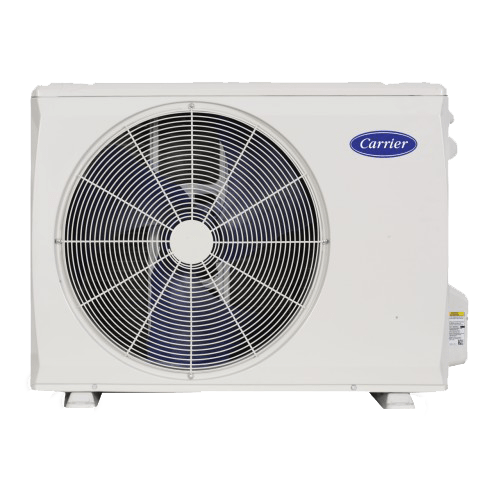Single Vs. Multi Zone Mini Split Systems
By Ryan Mayes
A reliable HVAC system is paramount for creating a comfortable and controlled indoor environment in your home. The significance of a high-quality heating, ventilation, and air conditioning system cannot be overstated, as it not only ensures optimal temperature regulation but also contributes to energy efficiency and overall well-being. Homeowners today have the option to choose from single and multi-zone mini-split systems, offering versatile solutions for personalized climate control. A single zone mini split system consists of one outdoor unit and one indoor unit and can provide temperature control for a single zone. In contrast, a multi-zone system consists of an outdoor unit connected to two or more indoor units, allowing for precise temperature management in different zones of the home. Some people will refer to a multi zone system as a 2-zone ductless mini-split when there are only two indoor units installed. For this article, we’ll be referring to them as 2-zone systems but just know in most cases additional zones could be added for more precise heating and cooling comfort control.

If you find yourself asking “ What is a ductless air conditioner? ”, we’ll answer that by delving into the world of ductless mini-split systems, exploring their functionality and advantages. Ductless mini splits consist of one outdoor unit and one or more indoor units connected by refrigerant tubing and electrical wiring, thereby eliminating the need for traditional ductwork. This not only streamlines installation but also enhances energy efficiency by preventing wasted energy from escaping through leaky ductwork. The benefits of ductless mini splits include minimal installation effort, efficient heating and cooling capabilities, and quiet operation, making them an ideal choice for homeowners seeking tailored climate control without sacrificing comfort.
Difference Between Single and Dual Zone Mini Split
Let’s explore the crucial decision of choosing between a single zone and dual zone ductless system for your heating and cooling needs. Ductless systems have become increasingly popular for their efficiency and versatility, but understanding whether a single or dual zone configuration is more suitable for your specific requirements is essential. We will delve into the differences, advantages, and considerations associated with each option to empower you in making an informed decision for optimal comfort and energy efficiency in your space.

Advantages & Disadvantages of Single Zone Ductless Mini Split
Advantages:
Lower Costs: Single-zone ductless mini splits are typically more affordable than a 2-zone ductless system because you only have one indoor unit compared to the two indoor units of a 2-zone system.
Easy and Quick Installation: Say goodbye to lengthy installation processes. Single-zone ductless mini splits are designed for hassle-free setup, and with the wall mounted indoor units, which are quick and easy to install, you can have your system up and running in no time. Learn more about how to install a mini split system.
Compact Design: Save space without sacrificing comfort. The compact nature of single-zone ductless mini splits makes them an ideal choice for those looking to maximize room space. With indoor units that are either wall mounted or installed in the ceiling, they don’t take up much space in your room. Experience efficient climate control without compromising the aesthetics of your living space.
Disadvantages:
Smaller Area of Heating and Cooling: While efficient, single-zone ductless mini splits are tailored for specific spaces. They may not be suitable for larger areas, but their targeted performance ensures optimal heating and cooling for the designated zone.
Visibility of indoor units. Mini split indoor units offer diverse styles such as wall-mounted, ceiling-mounted, floor-mounted, and in-ceiling installations. All these choices are prominently visible in a room, a feature that may not appeal to everyone.
Advantages & Disadvantages of Multi Zone Mini Split Systems
Dual zone mini split systems present a compelling set of advantages and disadvantages, making it crucial to weigh the pros and cons for an informed decision.
Advantages:
Zoning Capabilities: One of the standout features is the ability to create distinct zones for personalized comfort. This zoning capability ensures that different areas can be heated or cooled independently based on individual preferences.
Centralized Control: Enjoy the convenience of centralized control. With a dual zone mini splits, you can manage and adjust settings for multiple zones from a single point, enhancing overall operational efficiency.
Energy Efficiency: These systems are known for their energy-efficient performance. By allowing precise control over specific zones, dual ductless mini splits can contribute to reduced heating and cooling energy bills because you don’t have to heat or cool zones that aren’t being used. Learn more about mini split efficiency .
Disadvantages:
Initial High Cost: The upfront cost of dual ductless mini splits is often higher compared to single-zoned mini split systems. However, it's essential to consider the potential long-term savings in energy bills.
Installation Complexity: While installation is more complex than single-zone systems, it is essential to highlight that it remains relatively straightforward compared to traditional ducted systems. The complexity is mainly in comparison to simpler installations, like single-zone setups. Despite this, the efficiency gained often justifies the installation intricacies.
Understanding these advantages and disadvantages empowers you to make a well-informed decision based on your specific needs and priorities.
How to Choose a Ductless Mini Split System
Choosing the right ductless mini split system for your home requires a thorough understanding of your specific needs. Emphasizing the advantages of a single-zone system brings to light its suitability for smaller spaces and targeted climate control. In many cases, a single-zone mini split system could be ideal for smaller homes or to heat/cool converted living spaces, such as a garage or attic.

For larger homes or those with a focus on individual room temperature control, a multi-zone ductless mini split system might be a better choice. These advanced systems allow homeowners to tailor the climate in different rooms, ensuring personalized comfort throughout the entire house. With the ability to create zones, you can optimize energy usage and maintain the desired temperature in each living space.
Consider factors such as the size of your home, the number of rooms you want to control individually, and your overall heating and cooling requirements. By choosing the right ductless mini split system based on your unique needs, you can enjoy enhanced comfort, energy efficiency, and a climate control solution that perfectly aligns with your lifestyle.
Frequently Asked Questions About Dual Zone Ductless Mini Splits
Selecting the appropriate size for a dual-zone mini-split system is essential for achieving right comfort and energy efficiency. The question of "how big of a mini-split do I need" depends on factors such as the total square footage of the spaces, insulation levels, and the number of occupants. It's crucial to calculate the BTU rating based on these considerations, ensuring that each zone receives the right cooling or heating capacity. Additionally, individual zone requirements, considering factors like sunlight exposure and room usage, play a key role in choosing a dual-zone mini-split system that offers personalized comfort control. Prioritizing energy efficiency by opting for units with high SEER2 ratings contributes to cost savings and a more sustainable home.
The cost of 2-zone mini split air conditioners can vary based on factors such as size and quality. On average, the installed ductless air conditioner cost typically falls within the range of $2,000 to $10,500 or more. It's important to consider that the pricing fluctuates depending on the specific requirements of the installation, the capacity needed for each zone, and the overall quality of the system. Factors like energy efficiency ratings and additional features can also influence the total cost, allowing homeowners to choose a system that aligns with both their budget and performance expectations.
Yes, a mini-split can indeed have two zones, and such systems are commonly referred to as dual-zone mini-splits. These units are designed to provide independent climate control for two separate areas within a home or building. Each zone can have its own indoor air-handling unit, allowing for personalized temperature settings and comfort levels. Dual-zone mini-splits are versatile and efficient solutions for spaces where different cooling or heating needs exist, offering flexibility and control over the indoor environment.
Carrier Ductless Multi Zone Mini Split Systems
Discover the unparalleled comfort and efficiency of Carrier's ductless mini-split systems. Engineered with cutting-edge technology, Carrier ductless multi zone mini split systems offer precise climate control, allowing you to create a customized indoor environment for optimal comfort. With energy-efficient features and advanced cooling or heating capabilities, Carrier mini splits not only enhance your living spaces but also contribute to reduced energy consumption. Experience the benefits of quiet operation and innovative design. To learn more about how a Carrier mini-split system can elevate your home comfort, find a trusted Carrier dealer near you. Carrier Factory Authorized Dealers are NATE certified and can provide personalized information, expert advice, and professional installation services to ensure your home enjoys the best in ductless HVAC solutions.
Explore Carrier Ductless Air Conditioners
A Carrier ductless air conditioner offers flexible, energy-efficient cooling without the need for extensive ductwork, making it ideal for homes with limited space or existing duct systems. With precise temperature control for individual rooms or zones, it ensures personalized comfort and can lead to lower heating and cooling costs. Additionally, Carrier's ductless systems are designed for quiet operation and easy installation, providing an effective and discreet heating and cooling solution. Explore Carrier's line of ductless air conditioners today.
Système à une zone avec cote SEER2 allant jusqu’à 28.5 et cote HSPF2 allant jusqu’à 18 pour des économies d’énergie optimales.
Système à une zone avec cote SEER2 allant jusqu’à 28,1 et cote HSPF2 allant jusqu’à 12.4 pour des économies d’énergie optimales.
Learn More About Multi Zone Mini Split Systems
- Find a Carrier HVAC contractor in your area
- Discover ductless air conditioner for garage and other applications
- Read about ductless air conditioner cost
- Learn how to install a mini split system
- What is a ductless mini split?
- Are mini splits efficient?
- How big of a mini split do I need?
- How long do mini splits last?
- Learn about ductless mini split repair.
- Explore mini split placement
- Find out more about ductless mini split maintenance
- Comparing ductless mini split vs central air
- Mini split leaking water: diagnosis and repair
- Explore ductless mini split for garages
- Learn about the different ductless heating and cooling system types



